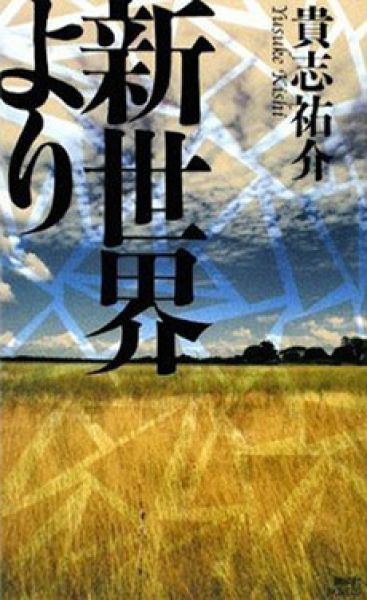Where the winds of limbo roar
Shin Sekai Yori
By Yusuke Kishi

12 Jan, 2017
0 comments
I was so annoyed by last week’s Translation Review selection (the Shin Sekai Yori manga) that I hunted down a fan translation of the novel on which the manga was based. Should a North American publisher ever print this or another translation, I will review that as well, with an appropriate link. Hint, hint.
Yusuke Kishi’s 2008 Nihon SF Taisho Award-winning Shin Sekai Yori is a standalone SF novel.
A thousand years from now, Saki Watanabe and her schoolmates, Satoru Asahina, Maria Akizuki, Mamoru Itou, Shun Aonuma, and Reiko Amano think that they live in a kindly world, one in which they are protected from danger. Fiends and karma demons cannot be current dangers; they are merely the stuff of summertime ghost stories.
Poor coddled teens! They are not safe. Fiends and demons are very real. However, the biggest dangers the children will face will be those created by their own society and their own choices.
Every child in Kamisu District 66 knows adolescence brings change, specifically, the development of psychokinetic powers. While the children have a vague sense that not every child gains an acceptable level of power and control, for some reason it never occurs to them to wonder too deeply about what happens to the children who do not develop powers or who use them improperly. This is because those children vanish, from the community and from their classmates’ memories.
Teenage curiosity draws the teens out beyond the psychic barriers around their town. In the forest lurks a relic of the lost civilization that preceded Kamisu 66, a living library that can explain how Kamisu 66 came to be. This is a dark and horrifying history; their parents are desperate to conceal it. Once the the adults know that the teens know, the teens will be in danger.
The choices that the kids make will divide them into:
- willing participants in injustice (however reluctant they might be to make this choice, it might just seem the least bad option);
- exiles;
- the dead.
~oOo~
The fan translation I used is the work of one avid fan (with crowd support — just like my reviews!). It’s rough in spots but you know, I’ve read 1970s DAW translations that were worse. A lot worse.
Having now read the original, I am even more disappointed in the manga. The author of the novel does a nice job with the incluing and worldbuilding: the “everyone is bi” premise is handled as a significant piece of worldbuilding, not something intended to titillate the male readers (um, probably best not to draw the attention of either Orson Scott Card or John C. Wright to this novel, even though in many other ways this book draws on an SF tradition of which they are professedly fond).
The big reveal, at least from my perspective, comes after the author has explained why the humans of the future have adopted their draconian rules. It has something to do with the backstory of the humanoid, intelligent queerats on whose labour the humans depend. The ironically named Ethics Committee made a terrible, spiteful decision ages ago. The results cast doubt on their benevolence and thus on all their other decisions; perhaps they are merely just another set of brutes ruling over oppressed peasants/queerats.
Alas, there is no authorized North American edition of this of which I am aware.
